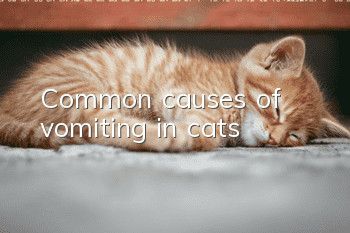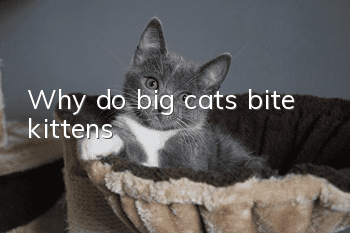Common causes of vomiting in cats

Cats are smaller in size and look more delicate. This is also true. Cats are also pets that are more likely to get sick, and vomiting is a common phenomenon in cats. However, vomiting does not necessarily mean that the cat is sick. There are many reasons that can cause cats to vomit. Cat parents should observe and analyze carefully so that they can prescribe the right medicine to get better as soon as possible.
1. Normal hairball vomiting. Cat dogs have the habit of licking their fur, and often lick part of their fur into their stomachs. When the fur licked into the stomach accumulates to a certain extent, the cat will vomit it out consciously. This situation can be determined by looking at the foreign objects in vomiting, and it is infrequent and has no other abnormalities. Depending on the cat's coat length, breed, licking habits, and the length of time between vomiting. Generally, cats will look for cat grass or some kind of plant similar to cat grass to eat before vomiting hairballs to facilitate vomiting. For example, biting flowers and eating raw vegetables (this behavior occurs, but it is not necessarily the reason). Some cats have difficulty vomiting hair balls. For mature cats with good physical condition and those without gastrointestinal diseases, you can feed them cat grass to induce vomiting. If the cat's physical condition is the opposite, you can feed it a hair-reducing cream to remove the hair in its stomach.
Two, catching cold and vomiting. This situation mostly occurs in young cats. Cold food and cold sleep can lead to vomiting. There are also factors involved here, both human and cat. Some are caused by cats stealing food, while others are caused by carelessness of the owner. For example, in winter, the cat’s food is too cold and the sleeping area is not warm enough. In summer, cats are fed frozen food, the food in the refrigerator is not completely defrosted, and they sleep under the air conditioner without covering, etc.
Three, food reasons. Kittens eating too much, or eating the wrong food, can also cause vomiting. For example, foods that are not suitable for digestion or are harmful.
Four. Gastrointestinal diseases. Gastrointestinal diseases can be treated in three parts and nourished in seven parts, with long-term care being the best strategy. The main symptoms are diarrhea, farts, smelly stools, soft stools, and bad breath. These are possible phenomena of gastrointestinal diseases, but these phenomena do not necessarily mean gastrointestinal diseases. Oral problems such as bad breath can also result. If you fart frequently, it is most likely caused by food. Specific issues must be carefully observed and analyzed.
Depending on the age and physical condition of the cat, some probiotics and other gastrointestinal drugs can be appropriately fed. Kittens are in the growing stage, and nursing them is the best choice. This type of disease is mainly caused by improper diet. To maintain your health, you need to pay attention to the temperature, amount, quality, frequency, and digestibility of food.
Fifth, poisoning and vomiting. This situation is mainly characterized by vomiting foreign bodies accompanied by green liquid. It is an emergency situation. It is recommended not to wait for a reply and seek medical treatment in time. If you cannot seek medical treatment in time, you should first let it finish vomiting, force-feed soapy water, and then let it vomit again, repeat this two or three times. No green seenThe color liquid basically removes all toxins. If you find that the cat is no longer able to stand up, do not force-feed it again. Then prepare mung bean water for it (do not force it) so that it can drink it at any time. Within three days in a row, it is best to only feed milk-based liquid food (refer to kitten feeding upstairs). If you have the conditions to seek medical treatment in time, it is not recommended to use this unacceptable method. This problem usually occurs with free-range cats and cats that often go out. Cats who don’t go out should also pay attention to keeping all kinds of harmful items indoors to prevent accidents. Such as insecticides, cockroach medicine, etc., and cats have the habit of licking their claws, and being stepped on by them will also cause adverse consequences.
Six. Caused by other diseases.
- How to toilet train a one-month-old kitten? Tips for potty training kittens
- How to solve the problem of cats not burying feces?
- Can cat grass be eaten every day?
- Cat has a lump in its belly
- How can I keep the cat from coming to the bed?
- Do cats eat less in summer? Why is the cat not eating enough?
- Why does the cat follow you?
- How to freeze-dry cats? Frequently asked questions about cat freeze-drying
- What are the symptoms of constipation in cats?
- What to do if cats get fleas on people?



